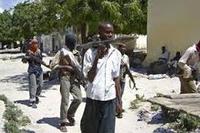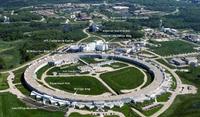-
More Americans see their electronic equipment seized by DHS at the border
The American Civil Liberties Union (ACLU) has released details of an investigation showing how U.S. law enforcement and other agencies exceed their powers in the name of homeland security. The ACLU points to the practice of the U.S. border agents searching and seizing the electronic devices of Americans at the border. Public data shows that more Americans are having their electronic devices searched.
-
-
Kenya mall attack may help terrorists recruit in U.S.

Some security experts believe that the deadly terrorist attack on a Nairobi shopping mall by Somali al Shabab militants is a “great shot in the arm” to the al Qaeda-linked group’s efforts to recruit fighters from the West, including the United States. Al Shabab is believed to have several thousand fighters, among them a few hundred foreigners. Some of those foreigners include recruits from Somali communities in the United States and Europe.
-
-
Three charged in Brooklyn with training to be suicide bombers for al Shabab
Prosecutors say that three men facing federal terrorism charges in New York City have strong ties to al Shabab, the group responsible for the Nairobi mall attack. Prosecutors in Brooklyn describe the defendants — Ali Yasin Ahmed, Madhi Hashi, and Mohamed Yusuf — as “dangerous and influential” members of al Shabab who were part of an elite unit of suicide bombers. They were captured in Africa last year while traveling to Yemen to team up with the al Qaeda offshoot there.
-
-
Egypt bans the Muslim Brotherhood, confiscates group’s assets
Egypt has banned the Muslim Brotherhood, continuing the process of marginalizing the Islamist movement and pushing it out of the country’s public life. A Cairo administrative court on Monday ordered the confiscation of the Brotherhood’s funds, buildings, and assets, and also banned the activities of the Islamist movement’s various spin-off groups. In effect, since early July, when then-president Mohammed Morsi was ousted, the movement has been forced underground.
-
-
Conference marks opening of UMass Lowell’s new Center for Terrorism and Security Studies
Top counterterrorism and law enforcement officials and leading researchers are today (Tuesday) gathering at UMass Lowell to discuss the challenges they face in protecting the public and their work to find solutions to security threats. The event marks the opening of UMass Lowell’s new Center for Terrorism and Security Studies.
-
-
Kenyan security forces in “final assault” on terrorist-held mall

Kenyan security forces last evening were preparing what they described as a “final assault” on the luxury shopping mall in Nairobi where armed Islamic militants were still holding about thirty hostages. As night fell on Nairobi, loud explosions could be heard from the Westgate mall where the members of the Somali jihadist group al-Shabaab had been barricaded since shooting their way into the mall on Saturday. The Kenyan authorities say that so far they have counted sixty-eight dead, 175 injured, and forty-nine missing, but that toll will likely rise. Unconfirmed reports said that three of the attackers were U.S. citizens of Somali descent.
-
-
Border communities decry Washington’s misguided emphasis on border security
Billions of dollars have been spent in an effort to secure the U.S.-Mexico border. Many border communities see investment in cross-border commerce, rather than spending money on fences and patrol agents, as a better way to reduce crime and illegal immigration. “We don’t need more Border Patrol agents — we need more customs agents,” says El Paso mayor John Cook.
-
-
Paul Goldenberg appointed to the Homeland Security Advisory Council
Paul G. Goldenberg, president of Hamilton, New Jersey-based Cardinal Point Strategies, was appointed to the Homeland Security Advisory Council to serve a 3-year term. Goldenberg has built a career as a criminal justice executive with experience in a variety of government and non-governmental organizations.
-
-
Iran indicates willingness to rethink nuclear program in exchange for sanction relief
As part of a series of steps designed to present post-election Iran as more pragmatic, President Hassan Rouhani and his advisers indicated they would be willing to consider curbs on Iran’s nuclear program in exchange for relief from the crippling economic sanctions imposed on Iran. Some Western experts say that all these steps are more than mere cosmetic changes, while skeptics note that Obama has reached out to Iran before, with no results. Veterans of past nuclear negotiations with Iran also noted that it is likely that Rouhani’s team may not yet fully understand the kinds of concessions that the Islamic republic would be required to make to have the most painful economic sanctions lifted.
-
-
Congress urged to support broad legislative agenda for science
With the U.S. Senate poised to revisit S. 1392, the Energy Savings and Industrial Competitiveness Act of 2013, the American Chemical Society (ACS) announced its support for the bill as part of a larger, legislative science agenda for 2013.
-
-
Aon calls on U.S. to extend expiring Terrorism Risk Insurance Act
Aon plc called on the U.S. government to extend the Terrorism Risk Insurance Act (TRIA), saying that TRIA remains the best solution for handling the terrorism insurance exposure in the United States. Aon says that if the program is allowed to expire, more than 85 percent of insurers will no longer continue to insure terrorism risk. Ultimately, in the unfortunate event of a large-scale attack, the U.S. government would face the full burden of the associated costs of said terrorism.
-
-
The side of Homeland Security you won't see on TV

The way the Department of Homeland Security is often portrayed in popular culture — surveillance and secret agents — leaves out a crucial aspect of its role. It also works on technology to detect attacks as they are happening, and helps federal and local governments prepare for all kinds of disasters, from hurricanes to accidental chemical spills to anthrax attacks. Argonne Laboratory engineers contribute to this effort, helping local and state governments form emergency plans, run drills for a pandemic flu outbreak in the city of Chicago, and analyzed ways to enhance security at plants and factories across the country.
-
-
Improving resilience of DHS work force
The U.S. Department of Homeland Security should develop and promote a unified strategy and common vision to build and sustain work-force readiness and resilience across the entire agency, says a new report from the Institute of Medicine (IOM), the health arm of the National Academy of Sciences. DHS expressed concern that it was not reaching the level of impact that it had hoped to achieve with its program to build resilience at the agency and asked the IOM to review its efforts, identify shortcomings, and provide recommendations for a five-year strategic plan.
-
-
Experts question ambitious Syria chemical weapons agreement
The announcements in Geneva by Secretary of State John Kerry and Foreign Minister Sergey Lavrov were bold: President Bashar al-Assad has a week to provide detailed, accurate, and comprehensive information about Syria’s entire chemical weapons program: research labs, production facilities, test sites, chemical storage depots, and munitions kept by every military unit. Experts say that the tight timetable the agreement requires for disclosure of stockpile, destruction of production facilities, and the destruction of the chemical weapons themselves, would not only set a speed record, but that that it cannot be accomplished even with Syria’s full cooperation.
-
-
Syria’s chemical program, inventory
The Syrian chemical weapons program began in the 1970s when the Hafez al-Assad regime purchased chemical munitions from the Soviet Union. In the 1980s, Syria launched a broad program of acquiring the materials, products, and knowledge necessary to set up an autonomous chemical weapons production capacity. In the nearly four decades of acquisition, research, development, and production, Syria has amassed what experts consider to be the world’s largest chemical weapons stockpile, consisting of about 1,000 tons of chemical agents and precursor chemicals.
-
More headlines
The long view
Factories First: Winning the Drone War Before It Starts
Wars are won by factories before they are won on the battlefield,Martin C. Feldmann writes, noting that the United States lacks the manufacturing depth for the coming drone age. Rectifying this situation “will take far more than procurement tweaks,” Feldmann writes. “It demands a national-level, wartime-scale industrial mobilization.”
No Nation Is an Island: The Dangers of Modern U.S. Isolationism
The resurgence of isolationist sentiment in American politics is understandable but misguided. While the desire to refocus on domestic renewal is justified, retreating from the world will not bring the security, prosperity, or sovereignty that its proponents promise. On the contrary, it invites instability, diminishes U.S. influence, and erodes the democratic order the U.S. helped forge.
Fragmented by Design: USAID’s Dismantling and the Future of American Foreign Aid
The Trump administration launched an aggressive restructuring of U.S. foreign aid, effectively dismantling the United States Agency for International Development (USAID). The humanitarian and geopolitical fallout of the demise of USAID includes shuttered clinics, destroyed food aid, and China’s growing influence in the global south. This new era of American soft power will determine how, and whether, the U.S. continues to lead in global development.
Water Wars: A Historic Agreement Between Mexico and US Is Ramping Up Border Tension
As climate change drives rising temperatures and changes in rainfall, Mexico and the US are in the middle of a conflict over water, putting an additional strain on their relationship. Partly due to constant droughts, Mexico has struggled to maintain its water deliveries for much of the last 25 years, deliveries to which it is obligated by a 1944 water-sharing agreement between the two countries.
How Disastrous Was the Trump-Putin Meeting?
In Alaska, Trump got played by Putin. Therefore, Steven Pifer writes, the European leaders and Zelensky have to “diplomatically offer suggestions to walk Trump back from a position that he does not appear to understand would be bad for Ukraine, bad for Europe, and bad for American interests. And they have to do so without setting off an explosion that could disrupt U.S.-Ukrainian and U.S.-European relations—all to the delight of Putin and the Kremlin.”
How Male Grievance Fuels Radicalization and Extremist Violence
Social extremism is evolving in reach and form. While traditional racial supremacy ideologies remain, contemporary movements are now often fueled by something more personal and emotionally resonant: male grievance.
